Business in Central Africa
Diploma “Foreign Trade and Business in Central Africa” (e-learning,
26 ECTS,  )
)
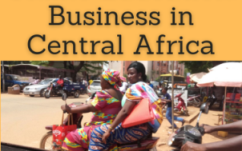
The main subjects analyzed in the Module “Foreign Trade and Business in Central Africa” (Angola, Cameroon, Congo...) taught by EENI Global Business School are:
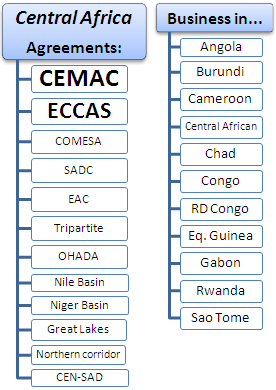
- The Central African Economic Area of the African Civilization
- Economic Integration in the Central African region
- Business in the Central African Countries (Angola, Burundi, Cameroon, the Central African Republic, Chad, Equatorial Guinea, Gabon, Congo, the DR Congo, Rwanda, and São Tomé)
- Central African businesspeople
- Logistics in Central Africa
- Trans-African Roads
- Main Central African Ports
- Other regional economic institutions and trade agreements related to Central Africa
- Business Plan for the Central African Markets

- Credits: 26

- Duration: 5 months It is recommended to dedicate about twelve hours of study per week following a flexible schedule. It is possible to reduce the duration dedicating more hours a week
- Download the syllabus (PDF)
Languages: 
- Also available in For improving the international communication skills, the student has free access to the learning materials in these languages (free multilingual training).
 Afrique Centrale
Afrique Centrale  Africa Central
Africa Central  Africa Central
Africa Central
This Module belongs to the following Higher Education Programs taught by EENI:
Master in Business in Africa, International Business.
Business in Central Africa: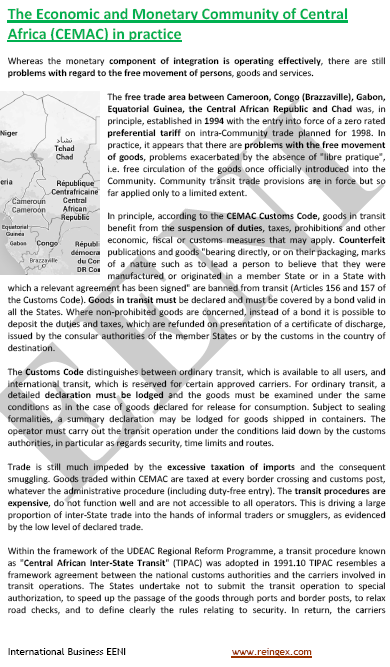

The main objective of the Module is to provide an overview of the Central African Economy and the business opportunities in order:
- To learn to do business in Central Africa (Angola, Burundi, Cameroon, the Central African Republic, Chad, Equatorial Guinea, Gabon, Congo, the DR Congo, Rwanda, and São Tomé)
- To know the trade opportunities in the Central African Markets
- To analyze foreign trade and foreign direct investment flows in the Central African countries
- To understand the importance of the CEMAC (Central African Economic and Monetary Community), ECCAS (Economic Community of Central African States), and CEN-SAD (Community of Sahel-Saharan States)
- To know the Trade Agreements related to the Central African Countries
- To know the main Central African business person
- To know the largest ports and Trans-African Corridors in the Central African Markets
- To design a business plan for the Central African Markets
Diploma intended for all those wanting to specialize in the Central African markets.

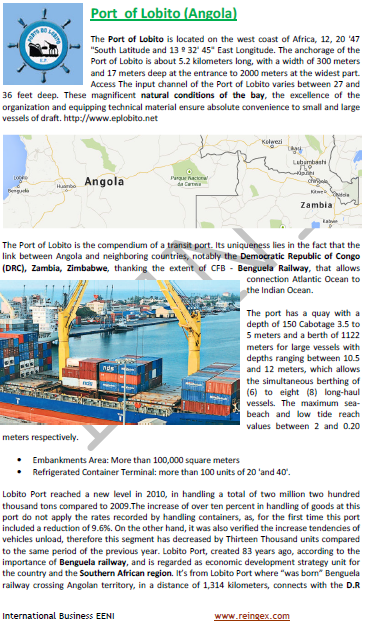
1- Regional Economic Integration in Central Africa.
The Central African Economic Area (PDF) of the African Civilization.

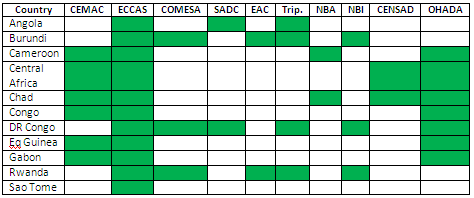
In Central Africa, there are two main regional economic integration processes:
- Central African Economic and Monetary Community (CEMAC)
- Economic Community of Central African States (ECCAS)
Furthermore, the Central African Countries belongs to other economic communities and regional institutions:
- COMESA
- Southern African Development Community (SADC)
- EAC
- CEN-SAD
- Niger Basin Authority (NBI)
- COMESA-EAC-SADC Agreement
- Economic Community of the Great Lakes Region
- Conference on the Great Lakes Region
- OHADA
- Nile Basin Initiative
- African Continental Free-Trade Area
- Maritime Organization for West and Central Africa (MOWCA)
- Bank of Central African States
- G5-Sahel
Trade Agreements with the other civilizations:
- GSP
- Africa-EU Partnership
- AGOA
- Islamic Trade Preferential System
- COMESA-US Agreement
- EAC-U.S. Agreement
2- Doing Business in the Central African Countries.
The Central African region consists of eleven countries: Angola, Burundi, Cameroon, the Central African Republic, Chad, Equatorial Guinea, Gabon, Congo, the DR Congo, Rwanda, and São Tomé.
- Business in Angola
- Business in Burundi
- Business in Cameroon
- Business in the Central African Republic
- Business in Chad
- Business in Equatorial Guinea
- Business in Gabon
- Business in the Congo
- Business in the DR Congo
- Business in Rwanda
- Business in São Tomé and Príncipe
3- Logistics in Central Africa

Trans-African Roads:
- Northern Corridor
- N’Djamena-Djibouti Corridor
- Trans-Sahelian Highway
- Lagos-Mombasa Corridor
- Tripoli-Central Africa-Windhoek Corridor
- Lobito Corridor
- Beira-Lobito Corridor
- Central Corridor
- North-South Corridor
- Port of Lobito
- Port of Luanda (Angola)
- Port of Douala (Cameroon)
- Port of Pointe Noire (Congo)
- Ports of Equatorial Guinea
- Ports of Gabon
4- Business Plan for the Central African Markets.
The Module includes the Market Access Tool:
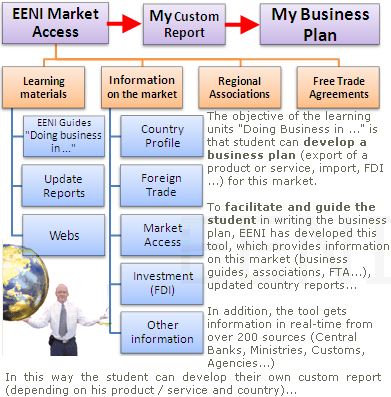
Other regional economic institutions and trade agreements in the Central African region.

- China-Africa Cooperation
- Africa-India Economic Cooperation
- African Development Bank
- Economic Commission for Africa
- African Union
- AUDA-NEPAD
- Islamic Development Bank
- Organization of Islamic Cooperation
Sample: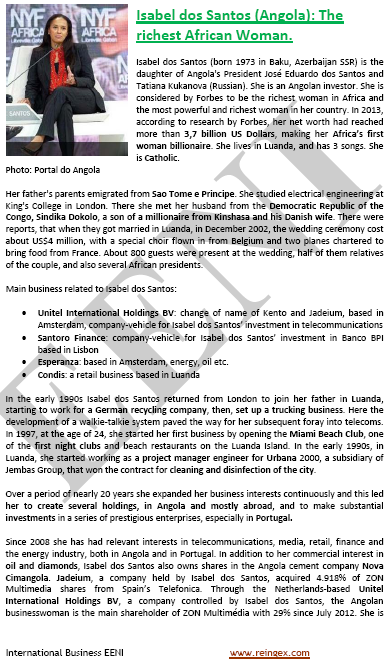
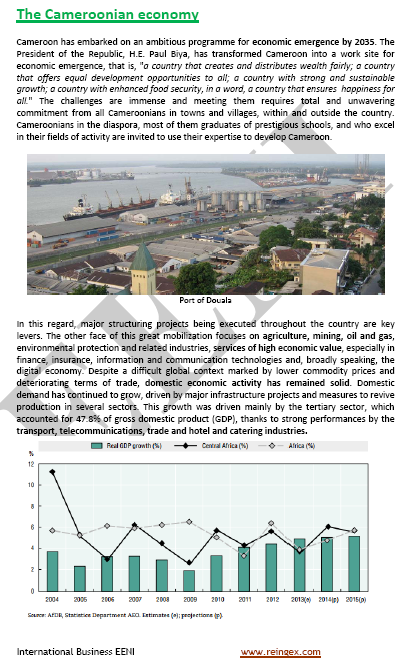
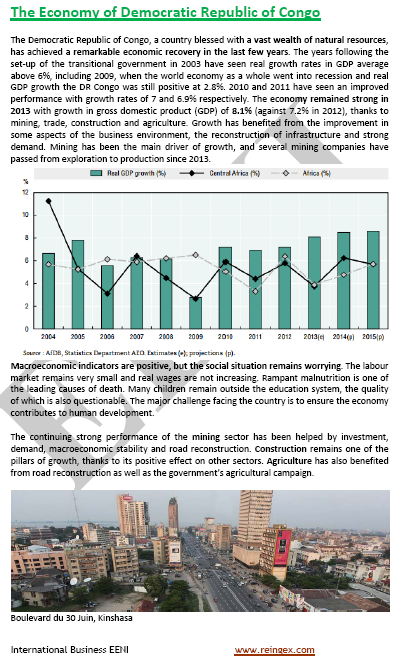
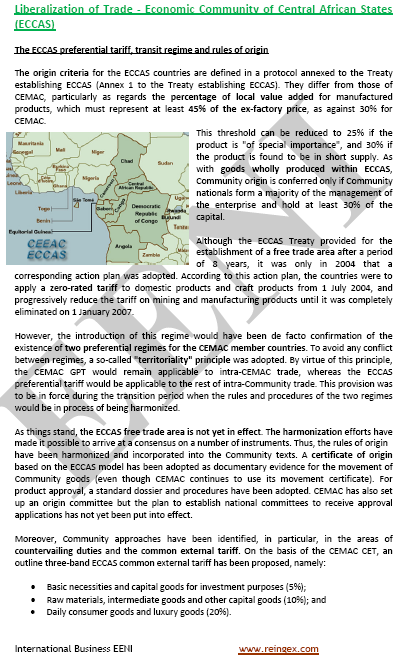
The largest religions of Central Africa are Christianity and Islam.
Area of Knowledge: Africa .
EENI African Students:
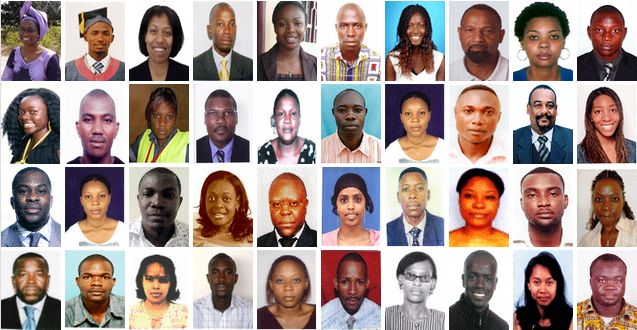
(c) EENI Global Business School (1995-2024)
We do not use cookies
Top of this page



